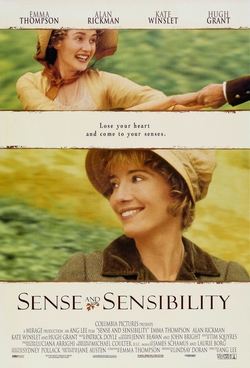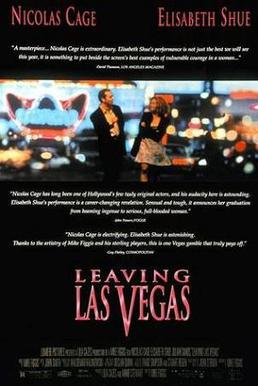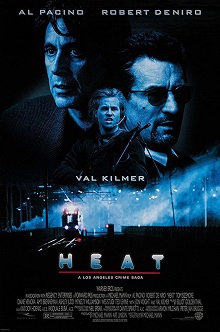 Richard Dreyfuss soars as a music teacher inspired by the people who love him in Stephen Herek’s Mr. Holland’s Opus (A-). This finely tuned film is filled with clichés and somehow still works, possibly because it deals with dreams deferred and the notion that even life’s smallest notes are part of a collective symphony. The quality of the acting, the music and the overall groundswell has quite a power to move.
Richard Dreyfuss soars as a music teacher inspired by the people who love him in Stephen Herek’s Mr. Holland’s Opus (A-). This finely tuned film is filled with clichés and somehow still works, possibly because it deals with dreams deferred and the notion that even life’s smallest notes are part of a collective symphony. The quality of the acting, the music and the overall groundswell has quite a power to move.
Tag Archives: Drama
Anthony Hopkins Shines in Oliver Stone Biopic “Nixon”
 Oliver Stone’s Nixon (B) is a surprisingly sympathetic portrait of one of America’s most controversial presidents. Stone uses some of his trademark visual bombast, but it’s his rare moments of tenderness that humanize the president and Anthony Hopkins’ touching performance that lift the film above revisionist history.
Oliver Stone’s Nixon (B) is a surprisingly sympathetic portrait of one of America’s most controversial presidents. Stone uses some of his trademark visual bombast, but it’s his rare moments of tenderness that humanize the president and Anthony Hopkins’ touching performance that lift the film above revisionist history.
Ang Lee’s “Sense and Sensibility” a Deft Comedy of Manners
 Emma Thompson aptly adapts Jane Austin in her screenwriting debut for Ang Lee’s splendid comedy of manners Sense and Sensibility (A). Co-starring the luminous Kate Winslet and Hugh Grant, Thompson the actress and writer unleashes tart exchanges as gossipy socialites, sycophants, snobs and civil servants find their way in a period piece about discovering love and happiness.
Emma Thompson aptly adapts Jane Austin in her screenwriting debut for Ang Lee’s splendid comedy of manners Sense and Sensibility (A). Co-starring the luminous Kate Winslet and Hugh Grant, Thompson the actress and writer unleashes tart exchanges as gossipy socialites, sycophants, snobs and civil servants find their way in a period piece about discovering love and happiness.
“Dead Man Walking” a Gripping Drama
 Director Tim Robbins makes the definitive film about the death penalty and shows all angles of a controversial topic through an intimate story about a nun (Susan Sarandon) and a death-row murderer (Sean Penn) in Dead Man Walking (A). Both actors give one of the best performances of their careers, and Robbins deftly directs their story without giving anyone easy answers. This is a thought-provoking drama and a reality injection for anyone who sees it.
Director Tim Robbins makes the definitive film about the death penalty and shows all angles of a controversial topic through an intimate story about a nun (Susan Sarandon) and a death-row murderer (Sean Penn) in Dead Man Walking (A). Both actors give one of the best performances of their careers, and Robbins deftly directs their story without giving anyone easy answers. This is a thought-provoking drama and a reality injection for anyone who sees it.
Mike Figgis Directed “Leaving Las Vegas” is an Unsentimental Romantic Masterpiece
 Meet Ben and tonic as director Mike Figgis addresses an addicted man and the woman who helps redeem him in the outstanding drama Leaving Las Vegas (A+). Nicolas Cage and Elisabeth Shue give career-best performances as the alcoholic and prostitute who enter each other’s lives when they both most need the reflection and support of a fellow human being in their darkest time. Handheld camerawork, vivid colors and the absolute conviction of dialogue and fine acting make this alternately sad and romantic piece work beautifully.
Meet Ben and tonic as director Mike Figgis addresses an addicted man and the woman who helps redeem him in the outstanding drama Leaving Las Vegas (A+). Nicolas Cage and Elisabeth Shue give career-best performances as the alcoholic and prostitute who enter each other’s lives when they both most need the reflection and support of a fellow human being in their darkest time. Handheld camerawork, vivid colors and the absolute conviction of dialogue and fine acting make this alternately sad and romantic piece work beautifully.
Michael Mann’s “Heat” Brings Out the Big Guns
 Michael Mann’s Heat (A-) is a high-gloss L.A. crime caper with suspense and thrills to spare, but the main attraction is getting to watch Robert DeNiro and Al Pacino turn in outstanding performances. They don’t share much screen time; but when they do, it’s explosive.
Michael Mann’s Heat (A-) is a high-gloss L.A. crime caper with suspense and thrills to spare, but the main attraction is getting to watch Robert DeNiro and Al Pacino turn in outstanding performances. They don’t share much screen time; but when they do, it’s explosive.
“Waiting to Exhale” Puts Spotlight on Black Women’s Stories
 Take a deep breath. Director Forest Whitaker is about to showcase the struggles and triumphs of a year in the life of four extraordinary women in Waiting to Exhale (B). Angela Bassett is the standout in the circle of friends as a woman who puts her dreams on hold for a man who disappoints her. Loretta Devine also gets a plucky role as one of her friends searching for love. With music by Babyface and a script adapted from Terry McMillan’s bestselling novel, it’s a fresh tale of empowerment.
Take a deep breath. Director Forest Whitaker is about to showcase the struggles and triumphs of a year in the life of four extraordinary women in Waiting to Exhale (B). Angela Bassett is the standout in the circle of friends as a woman who puts her dreams on hold for a man who disappoints her. Loretta Devine also gets a plucky role as one of her friends searching for love. With music by Babyface and a script adapted from Terry McMillan’s bestselling novel, it’s a fresh tale of empowerment.
“Casino” Compelling as Scorsese Changes Gangland Venue

A movie about the motives of mob men with simply a change of venue from his usual NYC neighborhoods isn’t too much of a gamble for Martin Scorsese; but few do this genre better, and the director gives Las Vegas its dressing-down in Casino (B-), by novelist Nicholas Pileggi. In style and structure, it’s often a facsimile of the much better GoodFellas, but Robert DeNiro and Sharon Stone get some great moments, and there’s a nice subtext to the game that’s being played in the floor versus the game being played behind the scenes. Still, it’s hard not to believe that Scorsese left some cards on the table and that he could have taken this story in some more creative directions.
Ron Howard’s “Apollo 13” a Chronicle of Bravery
 Director Ron Howard chronicles the night the lights went out in orbit in Apollo 13 (B+), a powerful drama about a NASA disaster with a strong cast including Tom Hanks, Kevin Bacon and Bill Paxton as astronauts in trouble and Gary Sinese and Ed Harris back in command center. The James Horner music is strong, with haunting vocals by Annie Lennox. Although character development could have been tighter, it is exciting and authentic and proves Howard has the right stuff.
Director Ron Howard chronicles the night the lights went out in orbit in Apollo 13 (B+), a powerful drama about a NASA disaster with a strong cast including Tom Hanks, Kevin Bacon and Bill Paxton as astronauts in trouble and Gary Sinese and Ed Harris back in command center. The James Horner music is strong, with haunting vocals by Annie Lennox. Although character development could have been tighter, it is exciting and authentic and proves Howard has the right stuff.
“Bridges of Madison County” Movie Features Wonderful Performances

Director Clint Eastwood’s The Bridges of Madison County (A) is a sensitive portrait of middle-aged romance, brought to sumptuous life by a sensitive artist. Who would have guessed a sketchy story about a lonely housewife who has an affair with a drifter over a long weekend would be a catalyst for Eastwood as both director and actor to communicate volumes? His muse – Meryl Streep – in great accent and with blissful vulnerability as Francesca, must make tough choices to either be faithful to her family or to live out her every repressed fantasy and escape from all that she knows. The film’s leisurely pace, gorgeously photographed American heartland and mature themes of personal responsibility help both characters and viewers to cross literal and figurative cross-ways into new emotional depths. It’s fun to get caught up in the whirlwind of the Robert-Francesca romance and really tough to come back to reality. It’s a profound film of memories and choices made that will impact the rest of your life.
“Before Sunrise” a Revelatory Glimpse at Young Love, Gen X Style
 Midway through Richard Linklater’s Before Sunrise (A+), a character asks, “Isn’t everything we’re doing in life a way to be loved a little more?” Leading to discussions, revelations, and lingering meditations, this question is but one thread in a tapestry of character study. Sunrise is a celebration of human language that reveals more about its loquacious characters than any film targeted to twentysomethings in recent memory. An American man (Ethan Hawke) and French woman (Julie Delpy) meet on a European train and spend a night walking and talking through Vienna. Through debate, Q&A sessions with imaginary friends, frisky flirting and more, the two reveal more in a night than many do in a lifetime. The film is a funny, romantic and thoughtful ode to discovering your soulmate and then learning to communicate with them.
Midway through Richard Linklater’s Before Sunrise (A+), a character asks, “Isn’t everything we’re doing in life a way to be loved a little more?” Leading to discussions, revelations, and lingering meditations, this question is but one thread in a tapestry of character study. Sunrise is a celebration of human language that reveals more about its loquacious characters than any film targeted to twentysomethings in recent memory. An American man (Ethan Hawke) and French woman (Julie Delpy) meet on a European train and spend a night walking and talking through Vienna. Through debate, Q&A sessions with imaginary friends, frisky flirting and more, the two reveal more in a night than many do in a lifetime. The film is a funny, romantic and thoughtful ode to discovering your soulmate and then learning to communicate with them.
Disney’s Animated “Lion King” One of 1994’s Best Films
 Roger Allers and Rob Minkoff’s The Lion King (A-) is a stirring animal version of Hamlet featuring some heavy themes about a “circle of life” with betrayal, death and ascension. The regal undertones and the Elton John tunes don’t always jive, but it’s hard to deny the power, poignancy and genuine beauty of this Disney animation milestone. This film marches with a triumphant beat and eschews the formula of the hits directly before it to fashion and even bigger juggernaut of global wonder.
Roger Allers and Rob Minkoff’s The Lion King (A-) is a stirring animal version of Hamlet featuring some heavy themes about a “circle of life” with betrayal, death and ascension. The regal undertones and the Elton John tunes don’t always jive, but it’s hard to deny the power, poignancy and genuine beauty of this Disney animation milestone. This film marches with a triumphant beat and eschews the formula of the hits directly before it to fashion and even bigger juggernaut of global wonder.












